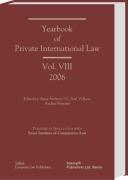| Listing 1 - 6 of 6 |
Sort by
|
Book
ISBN: 2247060528 9782247060528 Year: 2005 Volume: 49 Publisher: Paris: Dalloz,
Abstract | Keywords | Export | Availability | Bookmark
 Loading...
Loading...Choose an application
- Reference Manager
- EndNote
- RefWorks (Direct export to RefWorks)
Conflict of laws. --- Conflict of laws (Islamic law). --- Law --- Conflict of laws --- Culture conflict --- Droit international privé --- Conflit culturel --- Law and legislation --- Droit --- Law - Lebanon.
Dissertation
ISBN: 2247099106 Year: 2005 Publisher: Paris : Dalloz,
Abstract | Keywords | Export | Availability | Bookmark
 Loading...
Loading...Choose an application
- Reference Manager
- EndNote
- RefWorks (Direct export to RefWorks)
Laïcité. --- Droit international privé --- Religion et droit --- Ordre public (droit international privé) --- Conflit culturel --- Religion --- Études comparatives.
Book
ISBN: 9462653100 9462653119 Year: 2019 Publisher: The Hague : T.M.C. Asser Press : Imprint: T.M.C. Asser Press,
Abstract | Keywords | Export | Availability | Bookmark
 Loading...
Loading...Choose an application
- Reference Manager
- EndNote
- RefWorks (Direct export to RefWorks)
This book contains selected contributions presented during the workshop “Establishing Filiation: Towards a Social Definition of the Family in Islamic and Middle Eastern Law?”, which was convened in Beirut, Lebanon in November 2017. Filiation is a multifaceted concept in Muslim jurisdictions. Beyond its legal aspect, it encompasses the notion of inclusion and belonging, thereby holding significant social implications. Being the child of someone, carrying one’s father’s name, and inheriting from both parents form important pillars of personal identity. This volume explores filiation (nasab) and alternative forms of a full parent-child relationship in Muslim jurisdictions. Eleven country reports ranging from Morocco to Malaysia examine how maternal and paternal filiation is established – be it by operation of the law, by the parties’ exercise of autonomy, such as acknowledgement, or by scientific means, DNA testing in particular – and how lawmakers, courts, and society at large view and treat children who fall outside those legal structures, especially children born out of wedlock or under dubious circumstances. In a second step, alternative care schemes in place for the protection of parentless children are examined and their potential to recreate a legal parent-child relationship is discussed. In addition to the countr y-specific analyses included in this book, three further contributions explore the subject matter from perspectives of premodern Sunni legal doctrine, premodern Shiite legal doctrine and the private international law regimes of contemporary Arab countries. Finally, a comparative analysis of the themes explored is presented in the synopsis at the end of this volume. The book is aimed at scholars in the fields of Muslim family law and comparative family law and is of high practical relevance to legal practitioners working in the area of international child law. Nadjma Yassari is Leader of the Research Group “Changes in God’s Law: An Inner-Islamic Comparison of Family and Succession Law” at the Max Planck Institute for Comparative and International Private Law while Lena-Maria Möller is a Senior Research Fellow at the Max Planck Institute and a member of the same Research Group. Marie-Claude Najm is a Professor in the Faculty of Law and Political Science at Saint Joseph University of Beirut in Lebanon and Director of the Centre of Legal Studies and Research for the Arab World (CEDROMA).
Islam-Doctrines. --- Ethnology-Middle East . --- Private International Law, International & Foreign Law, Comparative Law . --- Islamic Theology. --- Middle Eastern Culture. --- Private international law. --- Conflict of laws. --- Islam—Doctrines. --- Ethnology—Middle East . --- Choice of law --- Conflict of laws --- Intermunicipal law --- International law, Private --- International private law --- Private international law --- Law --- Legal polycentricity --- Civil law
Book
ISBN: 9789462653115 Year: 2019 Publisher: The Hague T.M.C. Asser Press :Imprint: T.M.C. Asser Press
Abstract | Keywords | Export | Availability | Bookmark
 Loading...
Loading...Choose an application
- Reference Manager
- EndNote
- RefWorks (Direct export to RefWorks)


ISBN: 1282274570 9786612274572 3866537190 9783866537194 9781282274570 3866530188 Year: 2009 Publisher: Munich
Abstract | Keywords | Export | Availability | Bookmark
 Loading...
Loading...Choose an application
- Reference Manager
- EndNote
- RefWorks (Direct export to RefWorks)
Current Volume VIII (2006) of the Yearbook of Private International Law is arguably one of the most comprehensive collections of essays in English-language of our time: It presents the reader with a broad overview on the status and trends of private international law from the United States to India, from France to Tunisia, from England to China, from Latvia to Qatar, from Sweden to Japan. All main areas of law are addressed: among others, marriage, including same-sex marriage, adoption and protection of children, euthanasia and living wills, inheritance, contracts, torts, insolvency. Each of the four traditional steps of the "conflict process" is taken into account: adjudicatory jurisdiction, international cooperation and procedure, applicable law and its various incidents, recognition of foreign judgments. Practitioners will especially benefit from several contributions on international arbitration. Beneficial for: scholars, lawyers, judges, notaries, lawyers in law departments of international enterprises, legal libraries, working in the field of Private International Law.
Conflict of laws. --- Choice of law --- Conflict of laws --- Intermunicipal law --- International law, Private --- International private law --- Private international law --- Law --- Legal polycentricity --- Civil law
Digital

ISBN: 9783866537194 Year: 2009 Publisher: Munich Otto Schmidt/De Gruyter european law pub
Abstract | Keywords | Export | Availability | Bookmark
 Loading...
Loading...Choose an application
- Reference Manager
- EndNote
- RefWorks (Direct export to RefWorks)
| Listing 1 - 6 of 6 |
Sort by
|

 Search
Search Feedback
Feedback About UniCat
About UniCat  Help
Help News
News